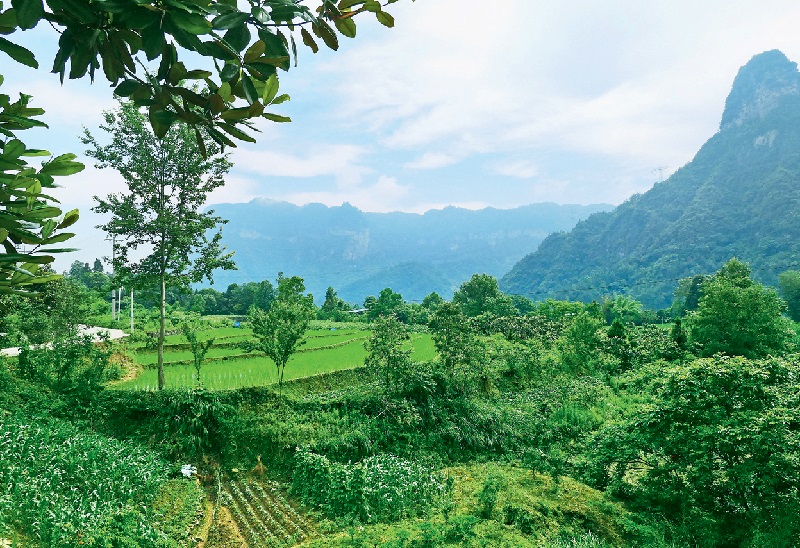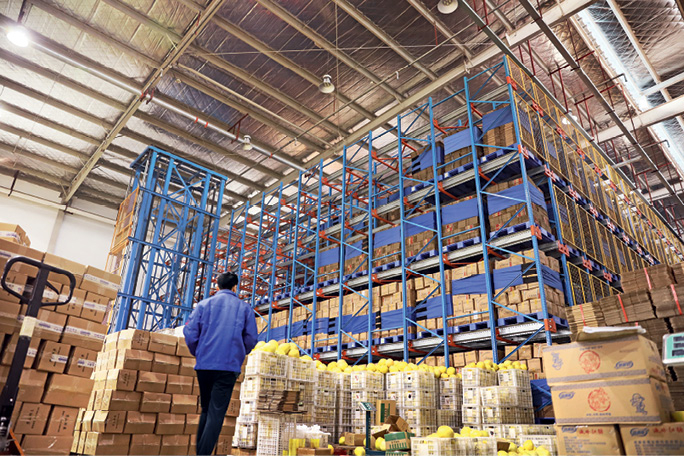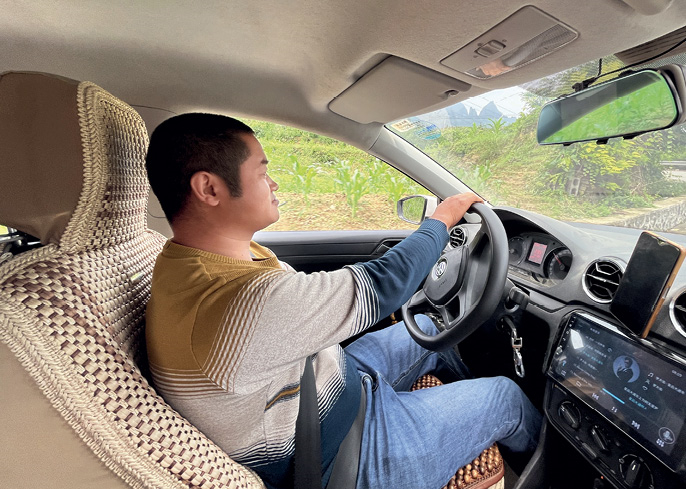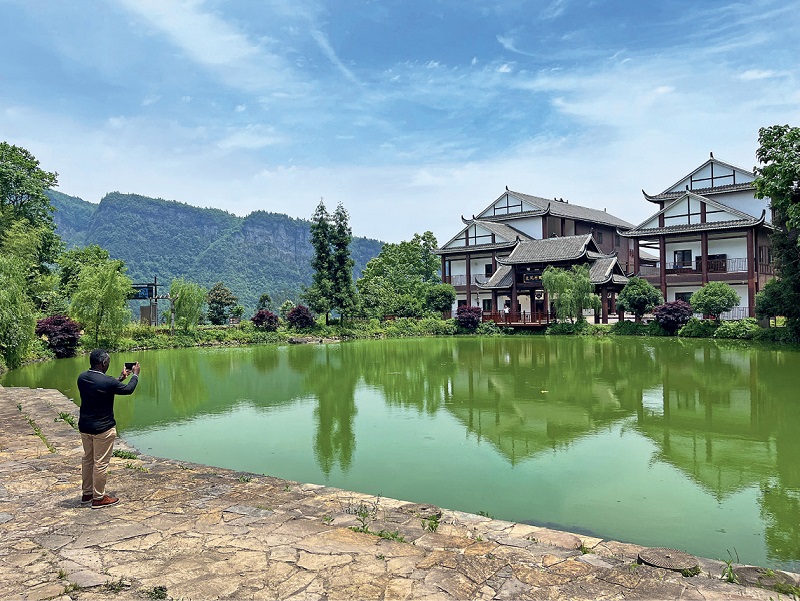Four mountainous areas emerged from poverty via relocation, rice culture, e-commerce, and tourism.
“If you want your kids to experience the hardships of life, take them to southeast Chongqing,” the elderly in Chongqing would often say. It was a reference to the tough life people led in the mountainous villages there despite Chongqing being a bustling megacity.
Mountainous, hard to reach, poor, and backward, this was how the villages perched on the Wuling Mountains were once described. The Call of Poor Mountains, a documentary made in the 1980s recording their plight, shows local villagers living in caves and shacks. Their clothes were ragged and they didn’t have enough to eat. There was no running water, and they couldn’t afford to see a doctor, no matter how ill they were.
Today, the region is becoming the new face of China’s development-oriented poverty alleviation. The remote villages have risen above absolute poverty and embarked on a new path of economic growth.

Zhongyuan, a mountainous village in Shihui Town of Qianjiang District in southeast Chong-qing, is covered with lush vegetation.
The Power of Relocation
It is early summer and the village of Zhongyuan is lush with vegetation. The roads wind through an abundance of trees with the traditional stilt houses of the Tujia ethnic group standing out. As Jiao Jintao drives along the winding mountain road, he honks his car horn to greet his neighbors passing by. Though he has driven on this road countless times, it still rekindles his memory of the past.
“We lived on high mountains and in the past we couldn’t even ride a motorcycle to our homes, let alone a car,” Jiao recalled. Then in 2008, the district government began a relocation drive as part of the campaign to eradicate absolute poverty. The villagers were given apartments in lower, more accessible areas set up with tap water, electricity, and good roads. It was more convenient for the relocated villagers to go to work, get medical treatment, and send their children to school. The Jiao family was among those who relocated.
After the change, it was much easier for Jiao to find work in factories and at construction sites outside the region. Finally, in 2020, he returned home with some capital, lots of experience, and exposure to the outside world to start his own business. His plan was to sell herbal medicine and grow vegetables while taking care of his elderly parents.
“While government support is vital, ultimately, we have to rely on ourselves,” Jiao said. His self-reliance comes from his business that brings him a net profit of over RMB 100,000 (US $13,838) per year after paying for the land he rents to farm as well as the wages of five farm hands.
Like Jiao, several villagers who left their home looking for work outside have now come back. Some of them are engaged in vegetable farming. Bok choy, pumpkin, pepper, and other vegetables produced in the village are sold in an urban area 20 kilometers away, creating livelihood opportunities for nearly 50 locals.
For the relocatees, moving down the mountain and leaving their hometown does not mean severing ties with their land. They say they plan to go back one day.

A worker is busy organizing goods in a warehouse of E-Commerce Processing Center in Xiushan.
Empowered by E-Commerce
The seasoning factory at the Wulingshan E-Commerce Processing Center in Xiushan County bustles with activities. The whirring conveyor belt produces packages of chicken seasoning watched over by workers. The products will be sold both in the Wuling Mountains area and online, reaching thousands of households across the country.
Xiushan was made famous by the novel The Border Town written by influential author Shen Congwen (1902-1988). Located in the border area between Hunan, Hubei, Chongqing, and Guizhou, it is over 420 kilometers away from the main city area of Chongqing and lagged in economic development. However, located on the largest plain in the center of the Wuling Mountains, it had great potential for developing into a logistics hub.
A decade ago, when e-commerce was burgeoning across the country, the local government built the Xiushan (Wuling) Modern Logistics Park that focuses on e-commerce as well as logistics. The development of e-commerce means more parcels, and the more parcels, the lower the logistics costs. Low logistics costs further stimulate e-commerce and related industries.
Xiushan boasts the only express distribution center in the Wuling Mountains area. Thanks to logistics facilities at their doorsteps, the local farmers who send out agricultural produce collectively save over RMB 100 million (US $13.8 million) in logistics costs every year.
Yang Qiu, general manager of Xiushan Qifei Trading, speaks of the changes: “In the past, we used to pay over RMB 10 (US $1.3) for the first kilogram of an express parcel, but now we pay RMB 1.6 (US $0.22). Besides, today, an express parcel headed for Guangzhou will be directly sent there in just one day.”
Xiushan’s logistics advantages are attracting downstream enterprises. Funong Food has a factory in Xiushan and their distribution network can cover an area of 300 kilometers through highways, radiating to dozens of counties in the Wuling Mountains, says Tao Qinghe, general manager of the company.
The booming e-commerce, logistics and supporting industries have created many jobs for locals. Chen Qiongzhen, who began working with the seasoning company in 2016, earns over RMB 3,000 (US $414) per month, and the company also provides her with basic insurance coverage.

Jiao Jintao, a local villager, driving on a winding mountainous road in Zhongyuan Village.
A Tribute Brand for Better Business
Hejiayan is known as the hometown of “tribute rice.” This village in Huatian Township has ideal conditions for growing rice – abundant sunshine, heat, and water coming from mountain springs. According to historical records, at the beginning of the 15th century, Zhu Di (1360-1424), emperor of the Ming Dynasty (1368-1644), tasted the rice grown here and was full of praise for it. The village then began to send rice to the royal palace as tribute. Today, after more than 200 years of development, Hejiayan has magnificent terrace land for rice cultivation.
A decade ago, the rice grown here was not able to be sold due to the lack of transport and other logistics problems, forcing almost all the young men in the village to go out in search of work. As a result, over 40 percent of the terraces were abandoned, and Hejiayan became a deeply impoverished village despite its historical tribute rice culture and fertile fields.
The turnaround came in 2013, when a core rice demonstration base was built in the village under the village cooperative, which distributes seeds, guides the cultivation, and purchases the rice. The Huatian tribute rice brand gradually became known. Now, the rice sells at RMB 24 (US $3.3) per kilogram, a huge jump from the earlier RMB 2 (US $0.28).
To popularize the brand further, the village launched the Hejiayan cloud rice project last year. It invites netizens to become “cloud farmers” by paying a fee of RMB 9.9 per square meter each to “adopt” the rice fields. They can watch the rice growing through live streaming and also learn about agriculture. When the rice is harvested, they get a portion of the processed rice. So far, there are more than 9,000 cloud farmers.
The rice field run by the project earned RMB 660,000 (US $91,249) last year, of which RMB 300,000 (US $41,477) was distributed among participating farmers, and RMB 200,000 (US $27,651) was deposited into the village’s mutual wealth fund for paying year-end bonuses.
He Yili owns a rice plot which he used to farm himself in the past. The income was meager – only RMB 10,000 (US $1,382) per year. Then he joined the project and last year, the bonus alone was RMB 15,000 (US $2,073).
In March 2023, the regional brand Youyang 800 was launched to develop local specialties such as camellia and rice into flagship industries. Hejiayan recently expanded this year’s cloud rice area, which will bring in more revenue.

Tianchi Miao Village in Houping Township is now a must-see for tourists.
Tourism for Transformation
A mouthwatering smell wafts out of Yao Tingrun’s restaurant in the village of Wenfeng as sausages, beef and vegetables sizzle on the barbecue. A restaurant is a novelty in this village located at over 1,100 meters and surrounded by mountains. The lack of transport cut off Wenfeng from development and growing corn and potatoes was the prime means of livelihood.
“In the past, it took over three hours to drive to our village from the urban area of the district,” says Luo Yuanfa, a local farmer. “On rainy days, the dirt roads would be full of livestock refuse, stinking and hard to walk on. I never thought we could develop tourism here.”
Despite the villagers’ disbelief, in 2018 the district government launched a project to develop the village through tourism. The project runs on a business model comprised of enterprises, cooperatives, and farmers. Forty-four households became partners by sharing the management rights of their fields, land, forests, and houses for 10 years. Tianchi Miao Village Homestay is a pioneering venture of the project.
The village, once lying deserted and impoverished among mountains, has suddenly become popular. A highway has been built, shortening the drive time from the urban area to the village to only 70 minutes. The traditional houses of the ethnic communities here, including the stilt houses, are a major tourist attraction.
The project gives the villagers a share in the profits as well as a bonus. In this way, natural resources have been turned into assets and farmers have become shareholders. Yao received poverty alleviation skills training organized by the municipal government, and learned to barbecue. Armed with his new skills, he opened a restaurant, which earned him RMB 40,000 (US $5,531) during last year’s National Day holiday in October. Luo Yuanfa runs a rural homestay with seven rooms, and the family’s annual income has crossed RMB 200,000 (US $27,656).
In addition, there are various supporting facilities, such as a folk culture exhibition hall, cinema, and cultural center. Catering alone brings in more than RMB one million every year, and drives agricultural product sales in the surrounding areas.
In the future, the local government will focus on integrated development of primary, secondary, and tertiary industries, develop rural businesses and promote high-quality agriculture. The goal is to build a livable and prosperous rural area and enrich more farmers. 
YE KAI is a reporter with china.org.cn